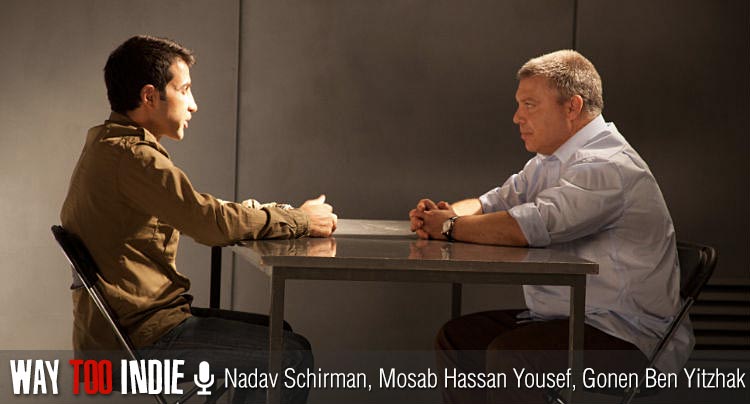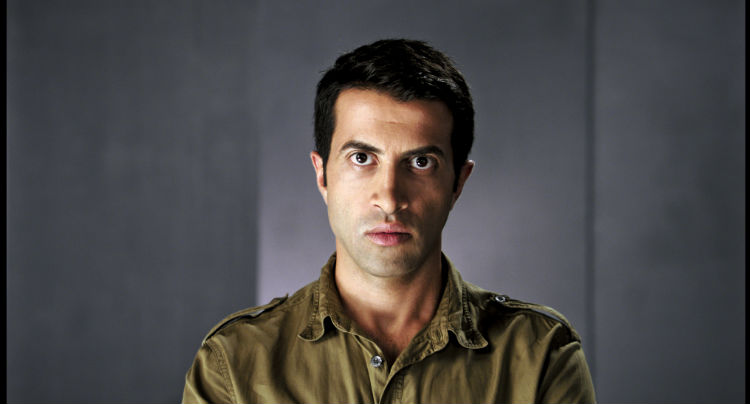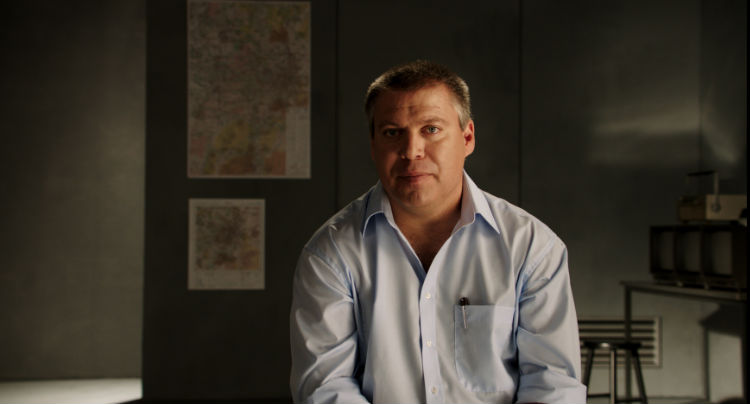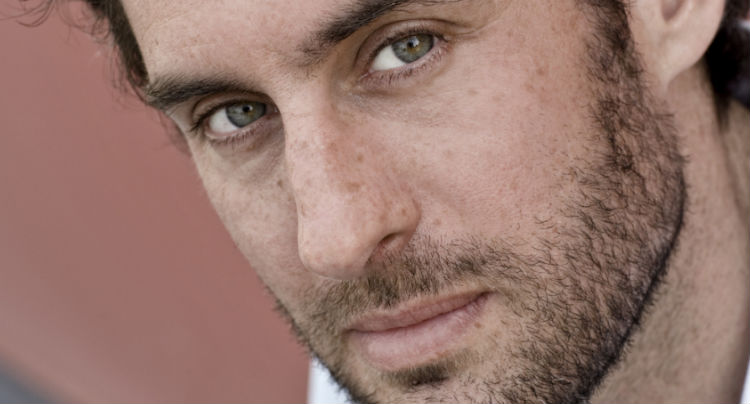Nadav Schirman, Mosab Hassan Yousef, Gonen Ben Yitzhak, and the Amazing Story of ‘The Green Prince’

A Palestinian and son of a Hamas leader, Mosab Hassan Yousef was raised deeply entrenched in the Middle Eastern conflict. In his early twenties, he was captured and interrogated by Gonen Ben Yitzhak, a “handler” working for the Shin Bet, Israel’s internal intelligence agency. Mosab was convinced to work for the Shin Bet undercover, and did so from 1997 to 2007, providing the agency with intel that helped them stop several terrorist attacks. Together, Mosab and Gonen saved the lives of many.
Eventually, Mosab revealed to his father and the Palestinians that he had been an undercover agent, consequently forcing him to move to the United States and start anew. He converted to Christianity and took shelter in his new home, away from Palestine where he would surely be under grave danger should he return. He wrote a bestselling book, “Son of Hamas”, in which he shared his extraordinary experience as an undercover agent. He was threatened with deportation from the US, however, when claims that his book supported “terrorist organizations” surfaced.
His political asylum threatened, Mosab seemed doomed to return to the Middle East. After years of not speaking, Gonen came to the aid of Mosab, revealing his own identity (a criminal offense in Israel) to testify on his friend’s behalf. Mosab resides in the US to this day, thanks to a friendship forged in the most unimaginable of circumstances.
Filmmaker Nadav Schirman‘s The Green Prince is a documentary not about the Middle Eastern conflict, but about Mosab and Gonen’s unlikely, unbreakable friendship. It’s a doc that feels like pulse-pounding thriller, covering the many close calls, double-crosses, and thwarted terrorist attacks the duo experienced together.
The day after their surprise appearance at a screening of the film at the San Francisco Jewish Film Festival a few months ago, we spoke to Nadav, Mosab, and Gonen about the audience’s reaction to their surprise appearance, Nadav’s great responsibility to respect his subjects and the audience, making a doc feel like a Hollywood thriller, Gonen putting his life on the line for Mosab, how the absurdity of undercover work can make you laugh, and much more.
The Green Prince opens this Friday in San Francisco and is playing in select cities.
 Mosab Hassan Yousef
Mosab Hassan Yousef
What was the audience’s reaction to your surprise appearance at the screening?
Nadav: It was amazing. I think the organizers expected a lot of tumult and polarized political views in light of the current situation [in the Middle East], so there was a lot of security and anticipation. And yet, when the film was over, all we got were standing ovations and a lot of love. The film seemed to unite people rather than divide them.Was that your intent when making the film? To bring people together?
Nadav: I’m a storyteller, my intent was to tell the story. I was touched and gripped by the story because of the hope that it conveys. It’s very rare for us–especially [in the Middle East]–to feel hope. We have a variety of feelings, but hope is not one of them. When I was acquainted with the story and met Mosab and Gonen in person, I felt that hope, the same as when somebody is pinching you. It was very tangible. That’s what compelled me to start the project. I’m very happy that I happened to channel that emotion into an audience.
Mosab and Gonen, what does it feel like to watch the film with an audience?
Mosab: It’s not an easy thing to see your life experiences in a 100-minute time frame. This is not who we are, basically. It’s a part of our experience, captured on camera. You always have more to say. We know that it’s impossible to encapsulate a human experience in film, but I think Nadav and the film team did an amazing job to bring the story to life again and make it visible to many people. We’re very grateful. We try to continue to be non-attached to the story. Whether people treat us as heroes or traitors, this is not who we are. We’re just human beings who were stuck in this situation, and we found a way out. Our goal now is to tell the millions of people still stuck in that war, that captivity, to come out. I hope some people find it educational and inspiring.
You touched on something interesting there. After what you just said, I presume there moments when you’re watching the film with an audience where you feel a desire to explain your experience further.
Gonen: Yes, of course. First of all, Nadav had to put everything we said–hours and hours of interviews–into 100 minutes. He needed to put many things we said aside. The first time we watched it was at Sundance. I don’t remember everything I said when we shot the movie, but this is the way Nadav decided to tell the story. It’s the best way we could ever tell our story. I felt different feelings at the Doc Aviv festival in Israel. Before the screening, I saw some people I knew from the Shin Bet, and suddenly I felt different. When I watched the movie with people from the Shin Bet and my family, it was different. When I talk about things in the film that happened in the agency, now the Shin Bet people are going to think about that.
Nadav: Sundance was the first time Mosab and Gonen saw the film. I was under a great deal of trepidation, because I felt that these two gentlemen had entrusted me with their story, and it was a great sense of responsibility. As Mosab said, you cannot encapsulate somebody’s experiences in a 100-minute film. The life experiences of Mosab and Gonen are mind-blowing. You get a glimpse of it in the film, but it’s much bigger than fiction. Hollywood heroes do not live what these two gentlemen live. There was a great responsibility there.
I think that’s the big difference between fiction filmmaking and documentary filmmaking: In fiction filmmaking, you’re only responsible to the audience, the studio, the financiers…you’ve got to make a great, entertaining film. But you’re pretty much free. Here, we had the responsibility of making the story very captivating and entertaining, but I personally felt a great responsibility towards Mosab and Gonen to be truthful. I felt a channel to the story, and perhaps channels that they were not aware of. It was a great load to carry, and I was very happy when they were pleased with the film at Sundance.
 Gonen Ben Yitzhak
Gonen Ben YitzhakThe film’s a documentary, but it has many elements of a Hollywood narrative film. What impressed me was that you were only working with two characters.
Nadav: That was a big challenge. We shot footage of other people who gave context to the story, but while editing the film, we realized that this is a story about a relationship, so let’s try to focus on that. Simon Chinn, one of my partners who had produced Searching For Sugarman and Man On Wire, together with John Battsek, they’re pioneers or shepherds of this non-fiction movement that’s taking over non-fiction films. Simon called this film a “two-hander” when we decided to tell the story as gripping as a thriller with just two characters. That became a part of the artistic challenge.
Again, I felt a great sense of responsibility on one hand to Mosab and Gonen, but on the other hand towards the audience, because this is a cinema film. People are going to go and pay money for a ticket, for parking, for babysitters. It costs $50, $60, $100 to see a film. If somebody’s going to pay that amount of money to see a film, you want them to not only be touched, you want them to be entertained.
It was a big team [making this film], and I think what happened was that people were so touched by the story that the whole team put their heart and soul in it. I remember sometimes we would ask Mosab or Gonen questions, and the answers were pouring out of them. I would look left and right and see the sound man and the assistant cameraman crying. I was like, okay, we’re on to something here.
Gonen, you’re used to being in the role of the handler. But in this experience, you were not the handler; someone else was. Did that take some adjustment?
Gonen: Yeah. Because I was working so many years as a handler, I was aware of the fact that I’m now switching places. From one side, I knew that I wasn’t the handler; I was the source. When I first med Nadav, it took time to trust him. But when I knew he was the one to make this project successful, I just forgot it. I went with the project and opened up to him. But in the beginning, I did have the feeling of, “Now someone else is handling the situation.” It was strange.
Was that uncomfortable?
Gonen: It was.
Nadav: What struck me was how similar the job of a film director is to the job of a handler. Basically, handlers create the setting for the source to trust them and go along with things and sometimes go against their own interests. That’s what film directors do all the time. I think, ultimately, you’re successful if the source believes in the cause.
Gonen: When we did all kinds of operations [in the Shin Bet], we needed to build a set–a story–and people were meant to believe it. It was like a movie. As a handler, I built a story for everyone to believe. It was also a very relieving process for me to step forward and tell my story. This was my first opportunity to tell my story to someone. It was always a secret. Legally, I was not supposed to tell anybody. When I told my story to Nadav, I didn’t get commision to tell it, but I felt a very heavy weight was sitting in my heart and I needed to tell the story. Nadav wasn’t just the director/handler, he was also my shrink. [laughs]
Mosab, your friendship with Gonen is out of this world, something most of us will never experience. Did you ever think the story of your friendship would be told to the world?
Mosab: I can’t forget the moment when I received an email from Gonen for the first time after I left the agency. We did not speak for a few years. We were one of the best teams in the agency, fighting terrorism. That was an amazing relationship. For me, it existed only within the agency. Outside of the agency, I didn’t know his real name, his address, his phone number–I didn’t know anything about him. When I left the agency, I left without anything. For me, he did not exist anymore.
When he heard I was struggling in the United States of America and he saw me on the front page of the news, he couldn’t stay silent. He emailed me, and I was really encouraged. The content of the email was his real name, how many children he has, and what he was doing in real life. He left the agency as well and was studying to become a lawyer. That was the first time we connected outside of the agency, on a new basis. This is something profound, something you can’t find. I understand the danger he was in. For him to expose his real identity to a source means going to an Israeli prison for eight years. This is what it took to make that email connection. He took a great risk, and that sustained me and gave me support. I knew that if I told the world my story and our experiences, no one would believe. But when there is an insider witness, it would make more sense. I can’t imagine my journey without his support and sacrifice.
There’s a scene I wanted to ask you about, Mosab, where your father is about to be arrested by the Israelis, and your arrest is going to be faked. You’re laughing. You’re laughing about having dinner with your family before this happens. What were you thinking as you recounted that experience?
Mosab: Working for the intelligence world, you start to differentiate between what is real and what is not real. You see the level of deception. You see the distorted perception of people, governments, media–this brings you to a point where you have no choice but to laugh. Basically, you see how many people are deluded and deceived and how many people aren’t willing to stand up for the truth. You know deep in your heart if you go out and tell the truth, you’ll get killed or persecuted. What else can you do but laugh?
Nadav, we talked a bit about how the film plays like a thriller. What does creating that kind of high suspense and urgency in a documentary entail?
Nadav: I never went to film school, and my whole approach to filmmaking is very intuitive. My film school was these two quotes Billy Wilder had put forward. One was, “Grab the audience by the throat and never let go,” and the other was, “Let the audience add up 2 and 2. They will love you forever.” These were the guidelines of making the film. I love thrillers, and I love suspense. Small screens, big screens–we’re surrounded by screens all the time. iPhones, tablets, TV’s–It becomes challenging to captivate an audience. The challenge was to captivate. From the moment the movie starts, you want the audience to be invested in the story completely. This is a story that has all the ingredients of drama which lead to catharsis. As a storyteller, this is what we live for. We’re here to generate emotions, a purge of emotions.
 Nadav Schirman
Nadav SchirmanThe aesthetics of the chamber in which Mosab and Gonen are interviewed is so cold and hopeless. I did not expect the film to end up in such a beautiful place. Was that strategic on your part?
Nadav: Very much so. There are three ways to gather intelligence: Visual intelligence, which is using drones and cameras where the human appears as a blip on the screen, devoid of humanity. Then, there’s signal intelligence–tapping in to phone calls and email conversations–which is used a lot today by the NSA. Again, there’s not humanity to this. The last one is human intelligence, and this is what Mosab and Gonen were engaged in. As a filmmaker, what I found interesting was that we had all three levels present in the film.
Going into this process, we knew Gonen and Mosab were masters of deceit. They could manipulate their answers to a great extent, so my role as a director was to “handle” them, as Gonen would say, to put them off-balance and give them the possibility of examining their narrative in a very different way. Mosab had written a book, and he was a very eloquent teller of his own story. Our role was to have him invest in his story in a very different way. I was more interested in the emotional aspects of the story and wanted him to lead us to the darkest corners of his own narrative. As a filmmaker, I was going to use the set, which was very imposing; 30-foot-high walls make you feel very small. We used the Errol Morris Interrotron, which was essential in truth-telling. I told Mosab, “Allow me to push you. Allow me to taunt you.” Sometimes Mosab stormed off the set and got really angry. It was tough, but he’d come back and sit in that chair, which was really hard.
This isn’t a political film at all. It’s a story we can all relate to, a friendship forged from strife. Screening the film in the US, what have been some of the most surprising ways you’ve seen the film touch people?
Nadav: When we screened the film in Park City, I was approached by some bankers from Texas. They said, “We know nothing about the conflict and aren’t particularly interested, but we were very touched by your film.” They were saying that the movie had inspired them to follow their own moral compass. I asked what they meant, and they said, “Every Monday morning, we have staff meetings at the bank.” Usually, the head of the bank outlines the operations for the week or the month. “As workers at the bank, we have two choices: If we disagree with the MO that is being presented, we can either speak up and risk losing our job, or we can lower heads and go with the flow.” They said the movie inspired them to speak up for what they believed in. That was very surprising. It transcended the story itself.
Gonen: There’s a negative approach from the Shin Bet when it comes to me. I got an invitation from a senior personnel who isn’t at Shin Bet anymore but at another organization in Israel. I was invited to a closed screening in Israel, and he told me, “In the agency some people think negatively of what you did, and some people think positively, but in general, people see the humanity of the story, even in the Shin Bet.” For me, this was very, very surprising.
Mosab: This is a story that took place in the Middle East, but it’s definitely a universal story. I think it’s a very important human journey, and not because it’s my journey. Again, I believe many people struggle in their own captivities, and I see on many people’s faces–young and old, men and women–some hope and inspiration to fight for something. It’s worth it to fight for something, even if you have to lose your identity, friends, or even your entire family. You stand for truth, for who we are. I see this already happening, and that’s the core of the message. I’m very happy.
